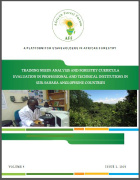Current training needs and emerging trends in the forestry sector have prompted a number of forestry educational institutions to review their traditional curricula in order to produce well equipped graduates. Traditional forestry curricula, as evidenced by the competence profiles of most forestry graduates, comprise gaps between acquired knowledge and skills, on one hand and market needs, on the other hand.
A training needs assessment was undertaken in Sub Sahara African (SSA) Anglophone countries, with the aim of assessing the content of the forestry curricula in professional and technical training institutions in comparison with current market needs and emerging forestry related issues. Primary data and information were collected from employers, research and training institutions through questionnaires. Secondary data and information on historical and existing identified training needs were obtained from literature. Follow up telephone and face-to-face interviews with selected organisations were conducted to ascertain facts as well as filling information gaps.
Institution visits were done for were Bindura University of Science Education (Zimbabwe), National University of Science and Technology (Zimbabwe), Makerere University (Uganda), Sokoine University of Agriculture (Tanzania) and University of Energy and Natural Resources (Ghana). Also, information was obtained from other professional and technical institutions, including University of Stellenbosch (South Africa), University of Ibadan (Nigeria), Malawi College of Forestry and Wildlife (Malawi), Nyabyeya Forestry College (Uganda) and Zimbabwe College of Forestry (Zimbabwe). The target group of forest graduate employers was determined through internet web searches. Employing organisations were categorised as, research institutions, NGOs as well as public/private forestry companies. The survey was conducted on 56 training institutions: comprising 41 universities and 15 colleges, 15 research institutions, 26 forestry public/private organisations and 12 non-governmental organizations.
It was observed that societal expectations of the forest graduate are increasing; demanding that forestry becomes generalist than specialist discipline. It was observed that there is variation in curricula on the same subject area across countries; however, the core forestry courses were covered. Emerging issues found to be deficient in recent forest graduates are on climate change, forest certification, fibre-food-fuels (FFF) nexus, integration of forestry with NRM, and agroforestry. Training institutions have acute shortage of teaching materials especially equipment, current literature and field facilities; some institutions do not have specialised forestry laboratories; there is negligible government and donor support; and ICT facilities are not reliable. It was also observed that earlier established institutions which were supported by FAO/UNDP and donor communities have well developed infrastructure. Unfortunately, the institutions struggle to sustain themselves and the donated equipment at inception is obsolete. Collaborative relations established are still running but are dictated by the donor community or project proponent who may not address local needs. On the other hand, the institutions established by African governments after their independence were never fully equipped and capacitated right from inception and are ill equipped and insufficiently funded. It is recommended that universities set up common interest region-specific satellite campuses as centres of excellence to address research and programmes that address challenges within that particular eco-region given that there are many issues which are of trans-boundary nature, as well as facilitate regional/sub regional economic integration that is fast taking place in Africa whilst the forestry sector lags behind. Training institutions are recommended to collaborate with relevant stakeholders for joint development and review of curricula. Countries may also adopt specialised curricula for women in social and/or community forestry to cover livelihoods and improvement of equal opportunities so as to expand societal potential.

